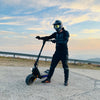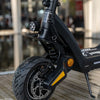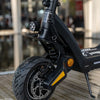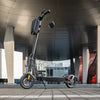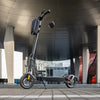Do Electric Scooters Work in Cold Weather? Everything You Need to Know for Winter Riding

When winter rolls in, many electric scooter users ask the same question: Can I keep riding in the cold? At GTXR, we believe electric mobility shouldn’t stop when the temperature drops. With the right precautions, electric scooters can be a practical (and even enjoyable) way to get around during winter months.
In this guide, we’ll explore how cold weather affects your scooter’s performance, which models handle it best, and what you can do to stay safe and efficient on chilly commutes.
How Cold Weather Affects Electric Scooters
Electric scooters are machines—and like any machine, extreme weather can influence their components. The most common effects include:
1. Reduced Battery Performance
Lithium-ion batteries lose efficiency in cold temperatures. Below 10°C, your scooter’s range can drop by 15–40%. Cold slows down the chemical reactions inside the battery, which means slower charging and faster draining.
2. Tire Grip and Traction
Cold pavement can be slippery, especially with ice or snow. Harder rubber in low temperatures provides less traction. This makes braking and turning more dangerous if you’re not cautious.
3. Frame and Brake Responsiveness
Metal contracts in the cold, which can slightly affect braking response or mechanical flexibility. This is more noticeable on budget scooters with lower-grade materials—not a problem on reinforced GTXR frames.
4. Moisture Risks
Snow, slush, and salt can sneak into scooter joints and electronics if your scooter isn’t properly sealed. This may lead to corrosion or short circuits if water seeps into unprotected components.
Tips to Use Your GTXR Scooter in Winter
Here’s how to ride smart and safe when temperatures drop:
Warm Up Your Battery Indoors
Before heading out, charge and store your scooter indoors to keep the battery warm. A cold battery starts out at a disadvantage—keep it cozy.
Lower Your Speed and Accelerate Gradually
Cold roads demand extra caution. Ride slower than usual, avoid sharp turns, and give yourself more time to brake.
Use Proper Tires
GTXR scooters with pneumatic tires offer better winter traction than solid rubber tires. Models like the GTXR DT06 or GTXR S10 are more suited for mixed or rough surfaces.
Stay Visible
Shorter days mean lower visibility. Wear bright clothing, use your scooter’s front and rear LED lights, and consider reflective tape or helmet lights.
Dry Your Scooter After Riding
Always wipe down your scooter when you come back indoors—especially near joints, folding mechanisms, and under the deck. Moisture buildup is the enemy of longevity.
Check Your Brakes More Frequently
Brake performance can fluctuate in winter. Test your brakes before each ride and adjust if necessary.
Best GTXR Models for Winter Commuting
Not every scooter is ready for winter, but some GTXR models are especially suited for colder climates:
• GTXR DT06: All-terrain wheels, excellent battery housing, and IP-rated water resistance
• GTXR S10: Pneumatic tires, dual brakes, and sturdy deck for snow-sprinkled paths
• GTXR G50 (with Happyrun): Fat tires and heavy-duty frame ideal for bumpy, slippery streets
These models are built to handle rougher conditions while keeping safety and performance at the forefront.
What Temperatures Are Too Cold?
Most GTXR scooters can operate down to -5°C, but consistent use in subzero conditions is not advised. Extremely low temperatures can:
• Permanently damage the battery
• Increase brake and tire failure risks
• Void warranties if used outside recommended temperature ranges
When it’s too cold to ride, consider using public transport and storing your scooter properly until temperatures rise.
Final Thoughts
Electric scooters can absolutely work in winter—as long as you understand the limitations and prepare properly. GTXR scooters are engineered with durability and adaptability in mind, giving you the confidence to ride even when the cold sets in.
Explore our winter-capable models and gear up at gtxrstore.com to keep moving—rain, snow, or shine.

